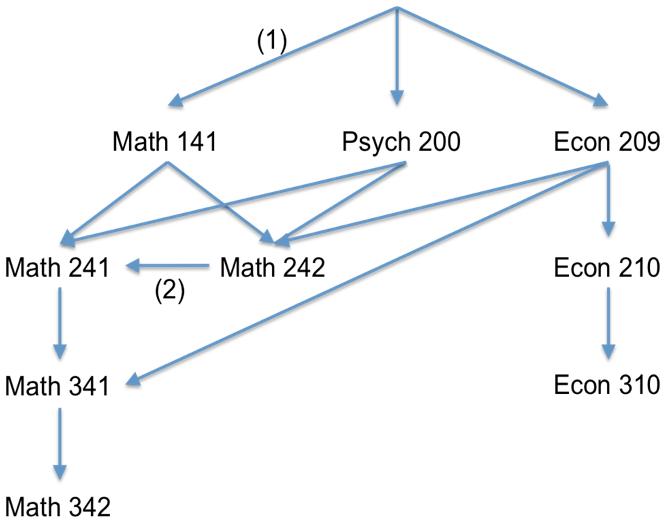Math 141 / Biology 141: Introduction to Statistics
The purpose of this course is to develop an appreciation and understanding of the exploration and interpretation of data. Topics include display and summary of data, introductory probability, fundamental issues of study design, and inferential methods including confidence interval estimation and hypothesis testing. Applications and examples are drawn from a wide variety of disciplines. When cross-listed with biology, examples will be drawn primarily from biology.
Psyc 200: Statistics & Experimental Design
An overview of principles of statistical analysis and research design applicable to psychology and related fields. Topics include descriptive statistics and inferential statistics, concepts of reliability and validity, and basic concepts of sampling and probability theory. Students learn when and how to apply such statistical procedures as chi-square, z-tests, t-tests, Pearson product-moment correlations, regression analysis, and analysis of variance. The goal of the course is to develop a basic understanding of research design, data collection and analysis, interpretation of results, and the appropriate use of statistical software for performing complex analyses. Ms. Andrews, Mr. Clifton, Ms. Trumbetta.
Econ 209: Probability & Statistics
This course is an introduction to statistical analysis and its application in economics. The objective is to provide a solid, practical, and intuitive understanding of statistical analysis with emphasis on estimation, hypothesis testing, and linear regression. Additional topics include descriptive statistics, probability theory, random variables, sampling theory, statistical distributions, and an introduction to violations of the classical assumptions underlying the least-squares model. Students are introduced to the use of computers in statistical analysis. The department.
Econ 210: Econometrics
This course equips students with the skills required for empirical economic research in industry, government, and academia. Topics covered include simple and multiple regression, maximum likelihood estimation, multicollinearity, heteroskedasticity, autocorrelation, distributed lags, simultaneous equations, instrumental variables, and time series analysis. The department.
Math 241: Probability Models
This course in introductory probability theory covers topics including combinatorics, discrete and continuous random variables, distribution functions, joint distributions, independence, properties of expectations, and basic limit theorems. The department.
Math 242: Applied Statistical Modeling
Applied Statistical Modeling is offered as a second course in statistics in which we present a set of case studies and introduce appropriate statistical modeling techniques for each. Topics may include: multiple linear regression, logistic regression, log-linear regression, survival analysis, an introduction to Bayesian modeling, and modeling via simulation. Other topics may be substituted for these or added as time allows. Students will be expected to conduct data analyses in R. Ms. An.
Econ 310: Advanced Topics in Econometrics
Analysis of the classical linear regression model and the consequences of violating its basic assumptions. Topics include maximum likelihood estimation, asymptotic properties of estimators, simultaneous equations, instrumental variables, limited dependent variables and an introduction to time series models. Applications to economic problems are emphasized throughout the course. Mr. Ruud.
Math 341: Mathematical Statistics
An introduction to statistical theory through the mathematical development of topics including resampling methods, sampling distributions, likelihood, interval and point estimation, and introduction to statistical inferential methods. The department.
Math 342: Applied Statistical Modeling
For students who have completed Math 341. Students in this course attend the same lectures as those in Math 242, but will be required to complete extra reading and problems. Ms. An.
- Prerequisite: Math 122 or 125, and Math 341
- Courses for which this is a prerequisite: (None)
- Courses with substantial overlap: (None)
Exception (1)
Not an option for students who score a 4 or 5 on the AP Stats Exam. Consider Psych 200 or Econ 209; or for those with computing background, consider Math 242.
Exception (2)
Not an option for students who have taken Econ 209. Consider Math 341 after taking Econ 209 and Math 242; or consider Math 341 and Math 342 after taking Econ 209.

